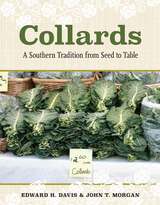2 books about Southern Tradition

Collards
A Southern Tradition from Seed to Table
Edward H. Davis and John T. Morgan
University of Alabama Press, 2015
Food is essential to southern culture, and collard greens play a central role in the South’s culinary traditions. A feast to the famished, a reward to the strong, and a comfort to the weary, collards have long been held dear in the food-loving southern heart. In Collards: A Southern Tradition from Seed to Table, Edward H. Davis and John T. Morgan provide this emblematic and beloved vegetable the full-length survey its fascinating and complex history merits.
The book begins with collards’ obscure origins. Like a good detective story, the search for collards’ home country leads the authors both to Europe and West Africa, where they unravel a tale as surprising and complex as that of southern people themselves. Crossing back over the Atlantic, the authors traverse miles of American back roads, from Arkansas to Florida and from Virginia to Louisiana. They vividly recount visits to homes, gardens, grocers, farms, and restaurants where the many varieties of collards are honored, from the familiar green collards to the yellow cabbage collard and rare purple cultivars.
In uncovering the secrets of growing collards, the authors locate prize-winning patches of the plant, interview “seed savers,” and provide useful tips for kitchen gardeners. They also describe how collards made the leap from kitchen garden staple to highly valued commercial crop.
Collards captures the tastes, smells, and prize-winning recipes from the South’s premier collards festivals. They find collards at the homes of farmers, jazz musicians, governors, and steel workers. Kin to cabbage and broccoli but superior to both in nutritional value, collard greens transcend human divisions of black and white, rich and poor, sophisticated and rustic, and urban and rural.
Food trends may come and go, but collards are a tradition that southerners return to again and again. Richly illustrated in color, Collards demonstrates the abiding centrality of this green leafy vegetable to the foodways of the American South. In it, readers will rediscover an old friend.
The book begins with collards’ obscure origins. Like a good detective story, the search for collards’ home country leads the authors both to Europe and West Africa, where they unravel a tale as surprising and complex as that of southern people themselves. Crossing back over the Atlantic, the authors traverse miles of American back roads, from Arkansas to Florida and from Virginia to Louisiana. They vividly recount visits to homes, gardens, grocers, farms, and restaurants where the many varieties of collards are honored, from the familiar green collards to the yellow cabbage collard and rare purple cultivars.
In uncovering the secrets of growing collards, the authors locate prize-winning patches of the plant, interview “seed savers,” and provide useful tips for kitchen gardeners. They also describe how collards made the leap from kitchen garden staple to highly valued commercial crop.
Collards captures the tastes, smells, and prize-winning recipes from the South’s premier collards festivals. They find collards at the homes of farmers, jazz musicians, governors, and steel workers. Kin to cabbage and broccoli but superior to both in nutritional value, collard greens transcend human divisions of black and white, rich and poor, sophisticated and rustic, and urban and rural.
Food trends may come and go, but collards are a tradition that southerners return to again and again. Richly illustrated in color, Collards demonstrates the abiding centrality of this green leafy vegetable to the foodways of the American South. In it, readers will rediscover an old friend.
[more]

The Southern Tradition
The Achievement and Limitations of an American Conservatism
Eugene Genovese
Harvard University Press, 1994
In recent years American conservatism has found a new voice, a new way of picking up the political pieces left in the wake of liberal policies. But what seems innovative, Eugene Genovese shows us, may in fact have very old roots. Tracing a certain strain of conservatism to its sources in a rich southern tradition, his book introduces a revealing perspective on the politics of our day. As much a work of political and moral philosophy as one of history, The Southern Tradition is based on the intellectual journey of one of the most influential historians of the late twentieth century.To appreciate the tradition of southern conservatism, Genovese tells us, we must first understand the relation of southern thought to politics. Toward this end, he presents a historical overview that identifies the tenets, sensibilities, and attitudes of the southern-conservative world view. With these conditions in mind, he considers such political and constitutional issues as state rights, concurrent majority, and the nature and locus of political power in a constitutional republic. Of special interest are the southern-conservative critiques of equality and democracy, and of the Leviathan state in its liberal, socialist, and fascist forms. Genovese examines these critiques in light of the specific concept of property that has been central to southern social and political thought.Not only does this book illuminate a political tradition grounded in the writings of John Randolph and John C. Calhoun, but it shows how this lineage has been augmented by powerful literary figures such as Allen Tate, Lewis Simpson, and Robert Penn Warren. Genovese here reconstitutes the historical canon, re-envisions the strengths and weaknesses of the conservative tradition, and broadens the spectrum of political debate for our time.
[more]
READERS
Browse our collection.
PUBLISHERS
See BiblioVault's publisher services.
STUDENT SERVICES
Files for college accessibility offices.
UChicago Accessibility Resources
home | accessibility | search | about | contact us
BiblioVault ® 2001 - 2024
The University of Chicago Press









